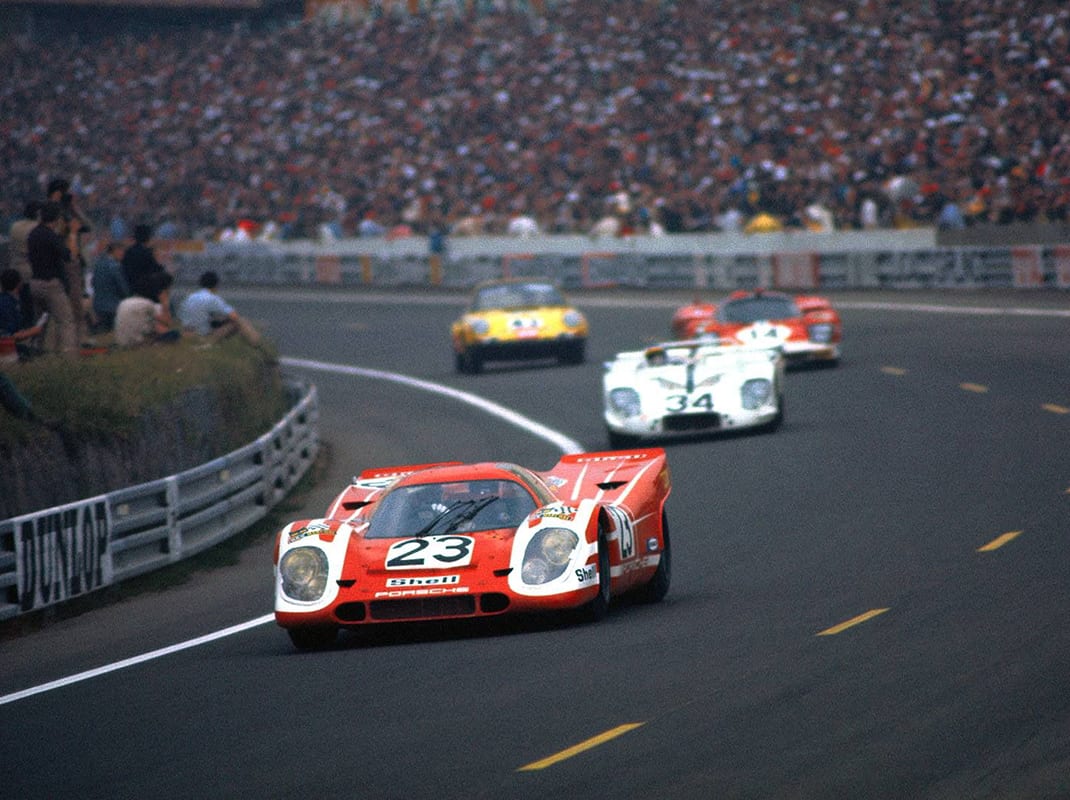Porsche has more victories in the prestigious 24 Hours of Le Mans than any other manufacturer, having won the twice-around-the=clock event 19 times.
Those 19 wins are six more than the 13 racked up by Porsche’s closest rival, Audi.
This year’s running of the French classic has been pushed back from its traditional mid-June date to Sept. 19-20 because of the COVID-19 pandemic.
Interestingly, it took the German manufacturer 20 years of competing at Le Mans before it claimed its first victory in 1970, 50 years ago. We look back at that race courtesy of the June 17, 1970, issue of National Speed Sport News.
LE MANS, France — After 20 years of trying, Porsche finally won at Le Mans in a race that got under way with a lackluster new start, was held for the most part in the rain and in which one man died.
The 38th edition of the great 24-hour endurance test for sports cars and prototypes will be remembered chiefly as Porsche’s Le Mans. The West German manufacturer had never won before Sunday when it took the first three places, six of the top 10 and had 12 of the 16 survivors of the 52-car field. And it might be remembered as Hans Herrmann’s Le Mans, although the West German did have a co-driver, Richard Attwood of England.
But Herrmann is still remembered from last year’s Le Mans, the veteran sports car racer who was outfoxed by the Grand Prix driver, Jackie Ickx, and lost by the closest margin in Le Mans history, about a hundred yards.
To those who were here, it was violent rain storms turning the track into a muddy pool, tossing the cars around like ships at sea, and dampening the traditional nighttime activities in the wooded areas.
It will hardly be remembered as the Le Mans where a cumbersome seven-liter Chevrolet Corvette chugged to an unofficial sixth-place finish only to be dropped from the standings; a Volkswagen powered by a six-cylinder Porsche engine was seventh and a star of a feature movie, eighth.
Nor will it be remembered for the almost incestuous relationships among the personalities involved. Try and follow. Herrmann and Attwood covered 4,607.810 kilometers or 2,764 miles at a waterlogged average speed of 115.20 mph.
Second by six laps (a lap is 13.461 kilometers, or 8.369 miles) was Herrmann’s co-driver of a year ago, Gerard Larousse of France.
Both Herrmann and Larousse drove 4.5-liter Porsche-917s. Last year, in a three-liter 908, they chased home Jackie Ickx of Belgium, who was driving a Ford GT-40 for John Wyer of England.
This year, Larousse and his co-driver, Wilbert Kausen of West Germany, had to out-duel a 908, driven by Rudolf Lins and Helmut Marco of Austria, for second place. And Ickx, the hero of a year ago who left Wyer to drive for Ferrari, left the race early in tragic circumstances. He killed a man.
Ickx was in second place, about five laps and one car-length behind Jo Siffert of Switzerland, the last survivor of Wyer’s Porsche team.
Ickx tried to get his five-liter Ferrari 512 into a one-lane S-turn ahead of Siffert’s 917.
Siffert got there first, Ickx slammed on the brakes, the rear wheels locked, the Ferrari went into a spin and crashed into the Ford Chiccne wall, which crashed onto the track official Jacques Argoud, 37, killing him.
Ickx, driving despite still painful burns he suffered in a crash in the Spanish Grand Prix last month, escaped unhurt physically.
Although there were 14 hours still to race, it appeared that Wyer might register his third straight victory here. Half an hour later, the engine on Siffert’s car gave way, after an early duel with Vic Elford in a Porsche 917 entered by a team registered in Salzburg, Austria, but in reality the unofficial works team. Elford’s car gave way also, but Herrmann took the other works Porsche home.
Siffert’s car jumped out of gear and the engine broke.
Porsche swept the top three spots with the Porsche 908 of Rudy Line and Helmut Marko finishing third overall and first in the Grand Touring class.
The best Ferrari, a 512 entered by the North American Racing Team, finished fourth, 30 laps behind the winner. It was driven by Sam Posey and Ronnie Bucknum.
